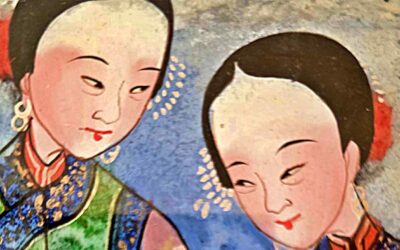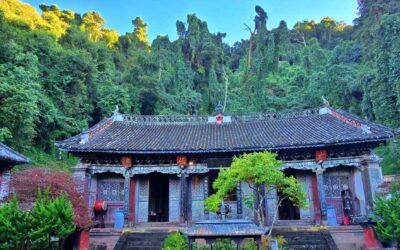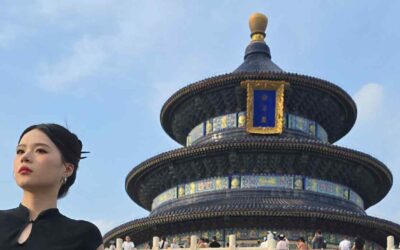Chinese Books about the Zhuang
This is not an exhaustive relation of books published in China about the Zhuang, nor a comprehensive bibliography about the, but merely the books that I had in my hand when I wrote this post.
Dai Guanglu.- Zhuang zu wenhua (Illust.) Yunnan Peoples Press. 2004. 273 pp
A nice book that explains in a didactic way, helped by many Pictures, different aspects of the way of life of the Zhuang Nationality living in Wenshan Prefecture, Yunnan Province.
Guo Lixin.- Tian shang ren jian (This world in heavens – examination notes on Zhuang culture in Dragon Ridge, Longsheng, Guangxi). Guangxi Peoples Press. 2006. 136 pp
Longshen is a County inhabited by many ethnic groups, some of them officially recognized, some not yet: This study focuses in the Zhuang population of Longsheng County.
He Puqing.-Yunnan Zhuang ju zhi (The Zhuang’s operas in Yunnan). Wenshan. 1995.352 pp
A kind of dictionary of the Zhuang opera in Yunnan Province, with information about the different types of operas, their most famous works, the music, the stage, the dances, and other aspects of Zhuang’s opera.
– He Zhengyan.- Zhuang zu jing si (Canonical poems of the Zhuang nationality) Yunnan Peoples Press. 2004. 766 pp
A bilingual version (Zhuang and Chinese) of the sacred poems of the Zhuang
Huang Guiqiu.- Zhuang zu mo wenhua yanjiu (Researches on the Mo culture of the Zhuang Nationality) Nationalities Press. 2006. 322 pp
This book aim breaks with the established tradition of consider Buluotou the main deity of the Zhuang. In it, the study of Buluotou in its first chapters is followed by the introduction of the world of the goddess Miloujia, the relationship between these two spiritual and symbolic realms, and with that of other goddesses.
Liang Tingwang.- Buluotou – Baiyue liao ren de shizu tuteng (Buluotou – totem and ancestor of the Baiyue Liao) Waiwen Publishers; 2005. 150 pp
The myth of Buluotou as the central aspect of the Baiyue culture.
Liao Mingqun.- Wangu chuanyang chuangshi ge (Ancient songs of creation – Investigations of the Bouxluegduz culture in TIanyang of Guangxi) Guangxi Peoples Press. 2006. 136 pp
This book studies the Zhuang poem of creation, Boluotou in pinyin, and its presence and influence in the life and culture of the Zhuang. According to the author the Buluotou culture is manifest in every aspect of Zhuang thought, and even the goddess Miliujia is only part of some old reproductive cults.
Liao Minjun.- Shengzhi chongbai de wenhua jiedu (Deciphering the culture of fertility cults). Guangxi Peoples Press. 2006. 601 pp
Though the book is not centered exclusively in the fertility cults of the Zhuang Nationality, most of the materials included are related to the Zhuang. The cult to stones, sun, moon, water, animal and plants are related to their fertility symbolism.
Tan Naichang et alt.- Pangu guo yu Pangu shenhua (Pangu country and the myth of Pangu) Nationalities Press. 2007. 402 pp
Following the legends about Pangu in Chinese classical literature that point to Guilin as the place where a Pangu Temple was erected, the authors analyze in deep Pangu myth to conclude that it was a myth of the forefathers of the Zhuang nationality that was transmitted to the north when the Han Chinese entered in contact with them.
Tan Shouda.- Heiyi Zhuang shenhua yanjiu (Researches on the mythology of the Heiyi (Black Dress) Zhuang) Guangxi Normal University. 2005. 208 pp
This book analyzes the importance of the black color to these people and the mythological origin of many of their cultural characteristics.
Wei Qilin.- Zhuang zu minjian wenxue gaikuang (An overview of the folk literature of the Zhuang Nationality). Guangxi Peoples Press.1988. 356 pp
A detailed study of the folk literature of the Zhuang minority, their typology and main works.
Zhang Yuansheng, Liang Tingwang and Wei Xinglang.- Gu Zhuang zi wenxian xuanzhu (A selection of old poems of the Zhuang) Tianjin Old Documents Press. Tianjin. 1992. 438 pp
A bilingual edition in Zhuang and Chinese of some of the main poems of the Zhuang Nationality, including:
– A version of Buluotou in 482 verses.
– The song of spread (Chuanyang ge). A philosophical poem.
– Chang Shun er – A song about a poor boy.
– Some instances of the «Biyu», a kind of short songs with educative purpose.
– Xiang he pan (think and hope)- A love poem.
– Guangxi minjian wenxue cong gan 9 (Selections about the popular literature in Guangxi- vol 9) Guangxi Folklore Press. 1983. 360 pp
Some articles about the folk literature in Guangxi Zhuang Autonomous Region, specially about the folk literature of the Zhuang.
– Qiguan dian dong (Wonders of east Yunnan). Dehong Nationalities Press. 2002. 139
A travel manual depicting the most interesting places in East Yunnan, in lands mainly inhabited by the Zhuang Nationality.
– Wenshan zhuang zu miao zu zhizizhou minjian geyao ji (Collection of popular ballads of Wenshan Zhuang and Miao Autonomous Prefecture). Wenshan. 1987. 166 pp
Most of the songs collected in this book are songs in praise of the Communist Party.
– Yunnan dizhoushixian gaikuang – Wenshan (Yunnan prefectures, districts, cities and counties – Wenshan) Yunnan peoples Press. 1988. 205
A general introduction to Wenshan Prefecture and its counties.
– Yunnan Zhuang zu ju xuan 1 (Selected theatrical works of the Zhuang Nationality in Yunnan- 1). Wenshan. 1983.452 pp
An interesting recollection of the popular theatrical works of the Zhuang in Yunnan
– Zhuang – dong yu zhu yuyan cihui ji (Lexicon of the Zhuang Dong languages) Central Nationalities Press. 1985. 330 pp
A comparative lexicon of nine languages belonging to the Zhuang Dong branch.
– Zhuang xiang – Guangnan (Zhuang village – Guangnan). Yunnan Nationalities Press. 2001. 154 pp
The culture of the Zhuang Nationality as preserved in a village in Guangnan.
– Zhuang zu minjian gushi (Folk tales of the Zhuang Nationality) Yunnan Peoples Press. 1988. 346 pp
A selection of the main works of the popular literature of the Zhuang in Yunnan: Myths, legends, tales, trickster and love stories,
[Cite]
Last posts
Suicide Caused by the Sale of Wives in Late Imperial China
Suicide Caused by the Sale of Wives in Late Imperial China During the Qing dynasty, family relations were a constant cause of suicide, especially for women. Many of the distinctive features of Chinese marriage pushed women toward suicide, one of the most lethal being...
Discover the Treasure of Weibaoshan Mountain in Yunnan
Discover the Treasure of Weibaoshan Mountain in Yunnan Weibao Mountain (巍宝山) is one of the sacred mountains of Yunnan. Within its relatively small area it brings together a historical, artistic, natural, and monumental ensemble that makes it a unique place in China...
Imperial Processions to the Temple of Heaven
Imperial Processions to the Temple of Heaven Those who know China—even if only through a brief trip—and who have visited the Temple of Heaven in Beijing will surely have been fascinated by the sober beauty of its buildings. Yet, whether on a crowded day or during a...







